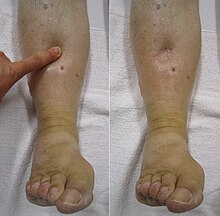
Back استسقاء (طب) Arabic Edema AST Şiş Azerbaijani اؤدم AZB Ацёк Byelorussian Оток Bulgarian শোথ Bengali/Bangla Edem BS Edema Catalan Edém Czech


Oedema (U.S. edema)[1] is dropsy. It was usually called dropsy until about the middle of the 20th century.
It is a medical condition, and a sign or symptom. It is swelling caused when fluid leaks out of the body's capillaries into the tissues. The fluid builds up and gets trapped in the tissues around the leaking blood vessels.[2] This causes swelling. If there is enough swelling, oedema can be seen from outside of the skin.
Oedema can happen in any part of the body However, it is easiest to see in the arms and legs, including the hands, ankles, and feet.[2] Oedema in the arms and legs is called peripheral oedema.[3]
Pulmonary oedema is fluid in the lungs.[4] Pulmonary oedema is dangerous because having fluid in the lungs makes breathing difficult. If pulmonary oedema gets bad enough, a person can drown in the fluid.[5]
Oedema in the abdomen is called ascites.[6]
- ↑ Note on spelling and pronunciation: The origin of the term is Greek. The O is silent, and it is pronounced as a long E (Ē).
- ↑ 2.0 2.1 "Edema". Mayo Clinic. 2014-09-19. Retrieved 2015-01-03.
- ↑ Dugdale, David (2013-04-21). "Foot, leg, and ankle swelling". Medline Plus. National Institutes of Health. Retrieved 2015-01-03.
- ↑ Chen, Michael (2014-05-13). "Pulmonary edema". Medline Plus. National Institutes of Health. Retrieved 2015-01-03.
- ↑ Ware LB, Matthay MA (December 2005). "Clinical practice. Acute pulmonary edema". N. Engl. J. Med. 353 (26): 2788–96. doi:10.1056/NEJMcp052699. PMID 16382065.
- ↑ Longstreth, George (2013-10-13). "Ascites". Medline Plus. National Institutes of Health. Retrieved 2015-01-03.